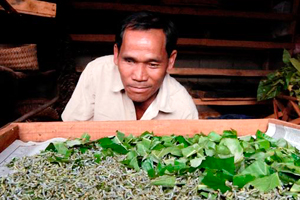For centuries, Lao silk textiles have been admired for their beauty, quality, and unique designs. The domestic and international demand for textiles has been high. Over the past 25 years, however, the silk industry in Laos has suffered a decline, and the demand has exceeded the supply. The limited supply of domestic raw silk creates a demand for imports from surrounding countries, resulting in higher costs and lower profits for silk weavers. From 1999 to 2006, the Laos Economic Acceleration Program for the Silk Sector (LEAPSS) was funded by USAID and implemented by the Consortium of World Education and World Learning. The project provided training, assistance, and technical support to silk growers in the remote provinces of Xieng Khouang and Houaphan. In addition, the program offered training and networking support to agricultural extension workers, weavers, small business owners, and traders, with a particular focus on women micro-entrepreneurs. The Consortium and its government partner planned for this program to serve as a policy model for future private enterprise development in Laos. The project was active through 2006.
Laos Economic Acceleration Program for the Silk Sectors (LEAPSS) (1999-2006)
Posted in

